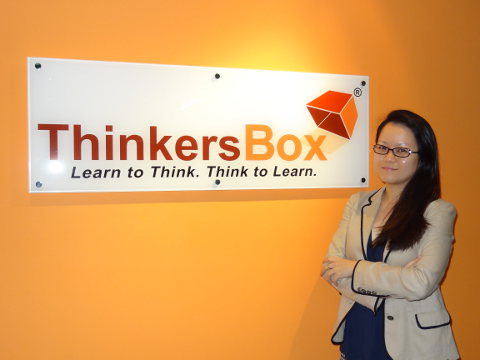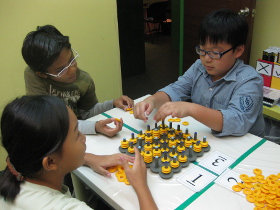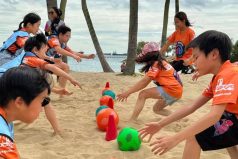A Cognitive Learning Specialist, Felicia Hoo was personally trained by Dr. Robert Meeker (co-founder of SOI Systems) and holds an Advanced Associate status using SOI’s Cognitive Assessment Tools and training methods. Her passion lies in helping children achieve their true learning potential by equipping them with strong cognitive skill sets. With 10 years of experience teaching children from 4 – 12 years old, she shares with TNAP, on what makes a person a critical thinker and how parents can develop their child’s cognitive skills.
TNAP: There has been a lot of talk going on about raising ‘critical thinkers’. In your opinion, what defines a person as a critical thinker?
A critical thinker is someone who is able to see beyond the given circumstances and allow the possibility of solutions outside the most obvious and also someone who is able to ask questions to challenge the given solutions
TNAP: In your opinion, what are the 5 most crucial skills for a child who is going to Primary School?
Based on the different cohorts of students we have assessed and trained, we realise the most crucial skills for effective and engaged learning in the classroom would be:
- Sustained Attention and Focus to be able to take in and absorb as much learning as possible
- Capacity for Retention to be able to store knowledge that was taught
- Strong Relational Thinking to be effective in making connections and grasping learning
- Good Visual Skills to ensure accurate reading and carefulness during work
- Effective Verbal Skills to ensure the child can follow the teacher’s explanation and teaching and communicate by asking the right questions
The above are just some of the crucial skills our children need to get ready for school, however, it is important to understand these are not the only skills they need and that there are a wider spectrum of abilities to look into when we analyse a child’s learning
TNAP: How do these thinking skills carry on to a child’s life as they grow, from secondary to tertiary education, and on to their work life?
The above skills listed do not just apply for children entering Primary School. In fact, if you look into the application and impact of each skill area, we will realise that throughout the different phases of our lives; we will still greatly need the ability to focus, remember, relate ideas, be observant and careful and understand what is the situation around us. I would say these thinking skills actually become more important as the child grows where the reliance on textbook knowledge reduces as they grow up and they become better in applying the knowledge in real-life scenarios.
TNAP: What can parents do, to foster such skills in their children?
Besides spending time to drill on subject content and school tasks such as spelling, parents should also take time to build the right fundamental skills for effective learning for their children, such as improving their attention span, teaching them to be observant, help them to form connections, etc. Parents may read our free e-books for such recommended activities.
 ThinkersBox program is not content but process based. Can you tell us more about what goes on during the process?
ThinkersBox program is not content but process based. Can you tell us more about what goes on during the process?
The learning process is driven by the student’s efforts and not what the teacher is teaching them. We do not cover subjects nor have curriculum-type lesson plans, rather every child is provided targeted activities in the form of modules to help them push up and improve their learning capabilities (or what we call their cognitive skills) Since no two child is the same in their learning, we need to then understand them as individuals and pace their improvements according to what they need and not based on comparing them with their peers.
TNAP: In your experience, what are some of the common problems you notice children face as they progress from lower to upper primary?
We see an increasing number of children facing visual difficulties as they progress and this results in carelessness in work, reluctance to read or generally not an effective reader because they are missing words or skipping lines. We also notice children not growing and developing in their vocabulary capacity as they progress through their learning. I believe this is because school work and other commitment increases as they move towards the higher levels, thus lesser time and opportunity is provided to do reading outside of school work; and our kids grow stagnant in their language growth. This can have a long-term impact in their career choices, communication skills and personal growth.
TNAP: Can these problems be prevented? How so?
Yes, of course! Parents can set aside time every day to read with the child and try to read books from a wide variety of topics so the child can be exposed to higher levels and vocabulary in varied contexts. The emphasis is on read ‘with’ the child as children enjoy an activity more when their parents are actively engaged with them. Build this habit from young and we would help our children set a strong foundation and love for reading throughout their life.
Parents should also keep a lookout for the amount of time our children spend on computer games and watching television. We are at a time where it’s near impossible to restrict our children from these activities, but it is still important to ensure that these fast-moving, colourful visual stimulus is well-balanced out with exposure to black-and-white, static information (such as when reading text). This is because our eyes have different photo-receptors for coloured and black-and-white information; so we should ensure our children receive stimulus and engagement in both forms of visual stimulus.
TNAP: What are some common misconceptions parents have with regards to a child’s learning process?
We meet parents who tell us their child is not motivated or not trying hard enough and that they just need to focus in order to get better results. However, when we assess the child’s learning abilities, we find that many times the child may be trying as hard as they can but still experience difficulty with school and learning because they are simply not equipped with the right skills to learn.
For example, a child who is distracted or has short attention span very likely has poor auditory attention skills and therefore this results in their ‘lack of focus’ behaviour. Or when a child makes careless mistakes on their work, it is highly possible they are not good in visual discrimination ability so it results in them not being able to be careful or observant about the details in their work (no matter how many times parents remind them to check their work!).
Every child is curious and excited to learn by nature. Remember how they used to ask questions about everything when they were younger? Children start to lose their ‘interest’ and ‘motivation’ over time if they do not experience success in their learning, just the same way we will lose interest in playing badminton if we can never serve right or play well, yes? So, it is very important that we ensure our kids are given the right skills to help them learn effectively and successfully because only when we are successful and good at something, then only will we strive to become better at it.
TNAP: Any last piece of advice to our parents?
Focus on the long-term investment for your child’s learning and not just what they need to learn for this year’s topics or examination; because learning is a process and it needs to be self-driven by the child’s innate ability to learn, to be curious and to enjoy the journey!
This article was first published in The New Age Parents Feb / Mar 2013 e-magazine
If you find this article useful, do click Like and Share at the bottom of the post, thank you.
Want to be heard and seen by over 100,000 parents in Singapore? We can help! Leave your contact here and we’ll be in touch.












































